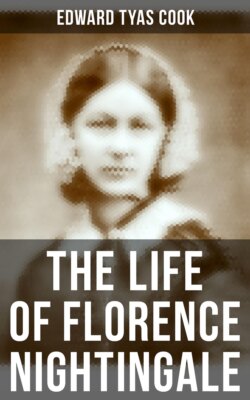Читать книгу The Life of Florence Nightingale - Edward Tyas Cook - Страница 37
На сайте Литреса книга снята с продажи.
V
ОглавлениеForeign travel, it will thus be seen, had worked no such cure, had created no such diversion, as her family desired. Their hope, even their expectation, was not unreasonable. Florence Nightingale was a woman of learning, and her foreign travels had stimulated her alike to research and to imaginative thought. At home, too, during all the years of restless and unsatisfied yearning for some other life, she had been a diligent reader and student. She had a real gift for literary expression, as her letters may already have indicated, and as her later writings were to prove more decisively. She had, moreover, the instinct for self-expression. She was a constant letter-writer and note-taker. She communed with herself not only in speechless thought, but in written memoranda. Had another impulse not been stronger within her, she might easily have become a literary woman of some distinction. But though she was fond of writing for her own satisfaction, she had a profound distrust of it as a substitute for action. Like one of George Eliot's heroines, “she did not want to deck herself with knowledge—to wear it loose from the nerves and blood that fed her action.” “You ask me,” she had written to Miss Clarke in 1844, “why I do not write something. I think what is not of the first class had better not exist at all; and besides I had so much rather live than write; writing is only a supplement for living. Would you have one go away and ‘give utterance to one's feelings’ in a poem to appear (price 2 guineas) in the Belle Assemblée? I think one's feelings waste themselves in words; they ought all to be distilled into actions, and into actions which bring results. Do you think a babe would ever learn to walk if it were to talk about its living in such ‘strange times,’ ‘I must learn to use my legs,’ and so on? Or do you think anybody ever did anything, who did not go to it with a directness of purpose, which prevented him from frittering away his impressions in words?” She was of Ibsen's persuasion:—
What is Life? a fighting
In heart and in brain with trolls.
Poetry? that means writing
Doomsday-accounts of our souls.48
She held in great suspicion and dislike what she called the “artist-like way of looking upon life.” It reduces all religions, she said, and most inward and spiritual feelings “into a sort of magic-lantern, with which to make play for the amusement of the company.” Her mother used to praise her “beautiful letters,” was proud of the “European reputation” she had won among learned men, and wanted to know why she could not be happy in cultivating at home the gifts which God had given her. To Florence Nightingale these things were not gifts to be cultivated, but rather temptations to be subdued. She read with some attention in 1846 a book called Passages from the Life of a Daughter at Home, a religious work containing counsels of submission for women dissatisfied with their home life. “Piling up miscellaneous instruction for oneself,” she wrote in one place in the margin; “the most unsatisfactory of all pursuits!” She strove to say to God, as she wrote in another place, “Behold the handmaid of the Lord! not Behold the handmaid of correspondence, or of music, or of metaphysics!” “That power of always writing a good letter whenever one likes,” she said in one of her pages of self-examination, “is a great temptation”—a temptation, if such it be, to which, it must be confessed, she continually succumbed. But she wished to win no repute from her fall. In 1854 her sister printed the “beautiful letters” from Egypt,49 and issued a few copies for private circulation. Florence was not pleased, but acquiesced, and corrected the proofs.
Any dreams, then, which she may have harboured of literary distinction, she had put resolutely away from her. “Oh God,” she had written in her diary at Cairo, “thou puttest into my heart this great desire to devote myself to the sick and sorrowful. I offer it to thee. Do with it what is for thy service.” But there was still one other temptation to be subdued.
